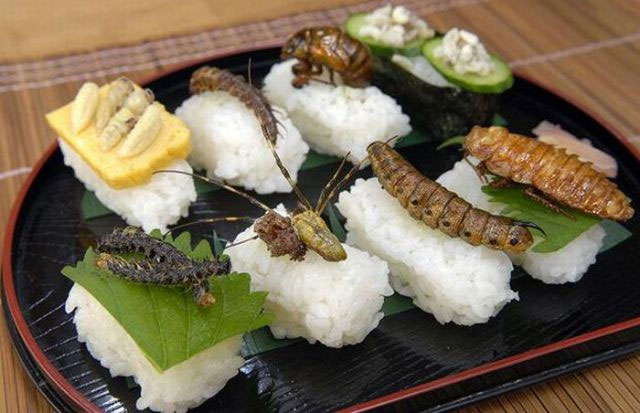What will humans eat in 20 years?
The increase in food prices is frequent, along with the trend of population growth, forcing scientists to expect for the next 20 years what everyone's diet will be like. They are seriously considering shifting humans to eating insects, artificial meat and algae, the BBC reported.
The UN representatives, along with European leaders, are very interested in what we will eat 20 years later because of the unstable situation in the environment as well as the economic situation worldwide. profit. Some foods, such as meat in the US and Europe, will become a luxury dish.
That's why the first thing people think about is replacing meat with a cheap protein source. Some proposals are directed at yeast and this has become completely normal over the years.
Insect

Insects will be the future food supply.
Morgan Gein, a prominent futurist, said: About 20 years later, insects will become 'mini- pets ' in the family.
This scientist thinks that this is a very reasonable option because insects have the same nutritional content (protein), if not much higher than the meat we still buy everyday. market.
Breeding insects requires far less water than livestock, they reproduce faster, cost less. From insects, restaurants can be processed into a variety of dishes for diners with a more multi-page menu.
The list of edible insects and carefully studied nutritional ingredients amounted to 1400 types. People have devised dishes and fruit cakes separately processed or combined with familiar ingredients, in which insects are often in the form of milled flour because not yet familiar with these new dishes should be in whole form, Many people are afraid to eat. Because of this, the Dutch government spent millions of euros researching insect food.
Meat from test tubes
Dutch scientists are now leading the world in artificial meat research. At the end of last year they created a laboratory piece of beef muscle tissue, going from real cow stem cells. The meat 'sample' they make doesn't look like meat but is similar to the body of the squid.
They promised that by the end of 2012, they would produce 'test tube sausages'. According to scientists 'meat from the laboratory' about the taste and nutritional value is not worse than meat from the livestock industry, while the production does not pollute the environment as the large livestock industry in the Traditional farm.
Algae
Currently, algae is one of the most common plants capable of contributing to the settlement of nutrients for humans and animals. It is possible to grow algae in the ocean with high productivity and unlimited area, as land is becoming scarce and climate change is happening rapidly making the land invasive. It can become a valuable food source in the next 20 years.
From this easy-to-grow plant material, people can also produce biofuels, much cheaper than fossil fuels, not just for food.
- Species settled in the Philippines 67,000 years ago
- Scary forecast: Humans are wiped out on Earth in the next 1000 years
- Humans know how to use whale meat 14,500 years ago
- See 550 million years of human evolution in 1 minute
- The prospect of extending life for 40 years for humans
- Humans know to eat plants from 180,000 years ago
- Can humans exist only until 2100?
- Do animals have menopause like humans?
- Humans and sharks have the same ancestors
- Humans can live up to 500 years by snail gene
- Why don't all primates evolve into humans?
- The prospect of extending human life by 16 years
 'Fine laughs' - Scary and painful torture in ancient times
'Fine laughs' - Scary and painful torture in ancient times The sequence of numbers 142857 of the Egyptian pyramids is known as the strangest number in the world - Why?
The sequence of numbers 142857 of the Egyptian pyramids is known as the strangest number in the world - Why? History of the iron
History of the iron What is alum?
What is alum?